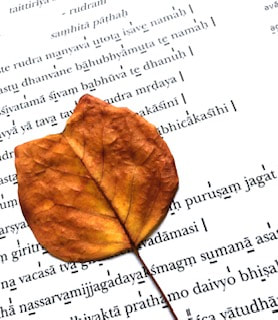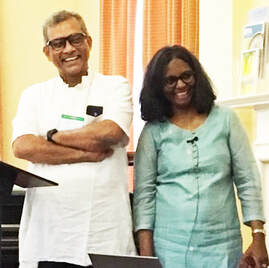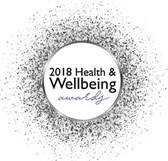|
I'm part of a community of teachers who participate in the Association of Yoga Studies (AYS). A group of a few hundred teachers, mostly in the UK, who meet annually to share teachings, learn from experts in their field, and continually develop our knowledge and understanding of yoga and yoga teaching. We are based in the teachings of TKV Desikachar and his father, Krishnamacharya, Viniyoga. Part of this tradition is chanting. Chanting the Yoga Sutras was a core part of my teacher training. Learning by heart some of this core text which forms the basis of much of what I teach. Even though it is over 2,000 years old, the teachings on the mind are so relevant to modern life. Being able to chant in Sankrit was a surprise part of my training that I didn't realise I was going to learn to do, but here I am, years later still continuing and participating in group chanting. There are practical reasons to learn how to chant... - breath development - learning the ancient teachings of the Vedas and Yoga Sutras by heart - focus and concentration (you literally can't drift your attention and remain true to the Sanskrit sounds without knowing that you have, as you'll make an audible mistake right away and bringing your focus keenly back) - quietening the body, nervous system and mind But something else happens when you chant, especially when your in a group. A resonance takes place in your own body and mind. Especially with the group sound, the coming together of individual voices to make a collective sound which is a wonderful and powerful experience. Anyone who takes part in a choir or orchestra will understand what I'm talking about. It's no coincidence that every culture has singing practices embedded deep within. And Covid has reminded us the value of being together in a room with others. Chanting in Sankrit, continuing the strict chant rules and pronunciation that has remained as unchanged as possible for over 2,000 years is an inspiring experience. It brings us together, connecting us individually, as a collective, and to the shared subtle underpinning of our everyday life. This past weekend I took part in a wonderful Vedic Chanting retreat with Chris Preist. Coming together with a shared joy of yoga practice and study with time for reflection and silence has never felt as needed as after the challenges of Covid. If you've ever wondered about chanting, please do ask me, or come to one of my workshops where we use simple chanting and sound practices. Or simply try humming to yourself and start to enjoy the sound and vibration. Try this...Lie on your back, knees bent.
~ Place your hands over your eyes (not pressing on the eyes themselves) and block out the light. ~ Gaze into the darkness and patterns that appear there. ~ Relax ~ And then take a soft, easy hum each time you exhale. ~ Do this for a few minutes, slowly listening to the sound of each hum. ~ No matter what note or quality of sound, and no matter if you like the sound of your voice or not. Feel the sound if you don't like to listen to it, ~ After 5 minutes, see how you feel. Something will have changed in you. ~ Ponder....
0 Comments
Yoga is a set of practices but also, it is an area of study. The practices that we embody - the movements and postures, the breath and the meditative supports - can be wonderful to simply experience and do. No prior knowledge needed. But as your experience and understanding develops the richer it becomes, As an adjunct to the practices is the understanding, the context and the wider practices of yoga, which are rooted in a rich, broad, deep and ancient tradition. Not something you get to grips with in a group class generally (try one of my Bristol-based yoga workshops or Foundation Courses to find out more about this).
The Association of Yoga Studies (AYS) of which I'm a teaching member, is a viniyoga community that meets every year and comes together for a weekend of wonderful yoga workshops. This weekend just past was our annual convention with an inspiring theme on Yoga and Music led by Ravi Shankar and Sheela Shankar from India. They are both long-time yoga scholars trained directly by Desikachar and Sheela is an accomplished classical Indian singer. They shared the most beautiful and subtle approach to yoga practice through sound, song, chant and ancient Vedic poetry. Sheela delightfully performed songs for us and then led us skillfully in ancient chanting practices. While Ravi gave us eloquent context and history around the chants that we practiced. As always with the teaching conventions, I've come away inspired to explore these subtle practices in my personal practice and feel re-rooted in the tradition of yoga. It is such a privilege to be welcomed into this warm and generous community all brought together by the legacy of the humble, honest and rigorous teachings of TKV Desikachar. What I love about the teachings in this weekend's community, is that your never more than a breath away from a reference to the Yoga Sutras or the Vedas. The ancient traditions are maintained with a thread of understanding that is brilliantly woven through the workshops and brought to life through the teacher. The interpretation of yoga hasn't been recycled so many times without reference to the original teachings, that it is barely recognisable as yoga at all (as is common in many modern yoga teaching approaches). Refreshing, inspiring, grounding and beautiful. Chanting sublimely embodies a timelessness that is hard to find in other yoga practices. The chanting of a song that was written millennia ago, chanted to the same clear, strict rules which means it sounded the same then as it does now (if your teacher is as skilled as Sheela Shankar) bringing you to the exact same point as the people who chanted it before you, The sounds, the breath and focus required to maintain the ability to chant in Sanskrit, the acute listening and heightened senses, the connection to that which is timeless, And the awareness that of course life hasn't changed that much. The outward appearance and experience is unrecognisable, but our internal experience is still on the same path and these teachings which were so valuable then, are still available to help make life and living better. Love it!! The Association for Yoga Studies (AYS) had their annual conference this weekend which was brilliantly inspirational. About 100 yoga teachers got together to share ideas, take workshops on everything from 'yoga breathing for pain relief during labour' to exploring faith or confidence through yoga. It was a great chance to discuss ways of teaching some of yoga's timeless principles. Ranju Roy and Dave Charlton were the plenary speakers focusing on Pajanjali's teachings in the Yoga Sutras about awareness, how yoga practice can effect our very being, effecting us potentially in quite profound ways, and also exploring how we see the world once we allow our yoga practice to deepen. Inspiring stuff.
Beyond the brilliant sessions from the weekend, a lasting memory is the Saturday night entertainment where we were led in a rendition of a funny song where we all joined in the chorus 'oh it all makes sense when your lying on the mat'. Funny but true... yoga helps us feel good on the mat, but the effects of yoga practice can be much longer lasting and helpful day to day - sometimes! |
More blog articles >Categories
All
Archives
July 2024
|
|
Bristol YogaSpace Ltd
Princes Place, Bishopston Just off Gloucester Road Bristol BS7 8NP |
|




 RSS Feed
RSS Feed

